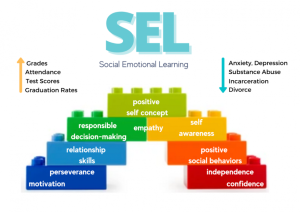Social-Emotional Learning (SEL) refers to the process through which individuals, particularly children and adolescents, develop essential skills for managing emotions, setting goals, showing empathy, establishing relationships, and making responsible decisions. SEL is increasingly recognized as a crucial aspect of education that supports not only academic success but also personal and social development.
Key Components of SEL
1. Self-Awareness
- Understanding one’s emotions, strengths, weaknesses, values, and how they influence behavior.
- Skills include recognizing emotions and assessing personal strengths.
2. Self-Management
- The ability to regulate emotions, thoughts, and behaviors in different situations.
- Skills include managing stress, controlling impulses, and setting goals.
3. Social Awareness
- The ability to understand and empathize with others from diverse backgrounds and cultures.
- Skills include recognizing social cues and appreciating differences.
4. Relationship Skills
- Skills necessary for establishing and maintaining healthy and supportive relationships.
- Skills include effective communication, teamwork, conflict resolution, and seeking help.
5. Responsible Decision-Making
- The ability to make constructive choices about personal behavior and social interactions.
- Skills include evaluating the consequences of actions and considering ethical standards.
Importance of SEL
1. Academic Success
- SEL has been linked to improved academic performance. Students with strong social-emotional skills tend to have better focus, motivation, and engagement in learning.
2. Mental Health and Well-Being
- SEL promotes resilience and coping strategies, helping students manage stress and anxiety. This contributes to overall mental health and reduces instances of behavioral issues.
3. Positive School Climate
- Implementing SEL fosters a supportive and inclusive school environment, reducing bullying and promoting positive interactions among students and staff.
4. Lifelong Skills
- SEL equips students with essential life skills that are valuable in both personal and professional contexts, such as effective communication, empathy, and conflict resolution.
Implementing SEL in Schools
1. Integrating SEL into the Curriculum
- Incorporate SEL objectives into existing curricula across subjects, ensuring that social-emotional learning is a consistent focus.
2. Professional Development for Educators
- Provide training for teachers and staff on SEL principles and practices, enabling them to model and teach these skills effectively.
3. Creating a Supportive Environment
- Foster a school culture that prioritizes SEL by implementing policies and practices that promote emotional well-being and inclusivity.
4. Engaging Families and Communities
- Involve families in SEL initiatives by providing resources and training on how to support social-emotional development at home.
5. Utilizing SEL Programs and Resources
- Implement evidence-based SEL programs that provide structured lessons and activities focused on the key components of SEL.
Challenges and Considerations
1. Resource Allocation
- Schools may face challenges in allocating time and resources for SEL initiatives amidst academic demands.
2. Assessment and Evaluation
- Measuring the effectiveness of SEL programs can be complex. Schools need to develop appropriate assessment tools to evaluate student progress.
3. Cultural Sensitivity
- SEL initiatives must be culturally responsive and consider the diverse backgrounds of students to ensure relevance and effectiveness.
4. Sustainability
- Ensuring the long-term sustainability of SEL programs requires ongoing commitment from school leaders, educators, and the community.
Conclusion
Social-Emotional Learning is a vital component of a holistic education that supports the development of well-rounded individuals. By prioritizing SEL, schools can equip students with the skills they need to navigate challenges, build meaningful relationships, and succeed both academically and personally. As the understanding of SEL continues to evolve, its integration into educational practices will play a crucial role in fostering positive outcomes for students and communities alike.



